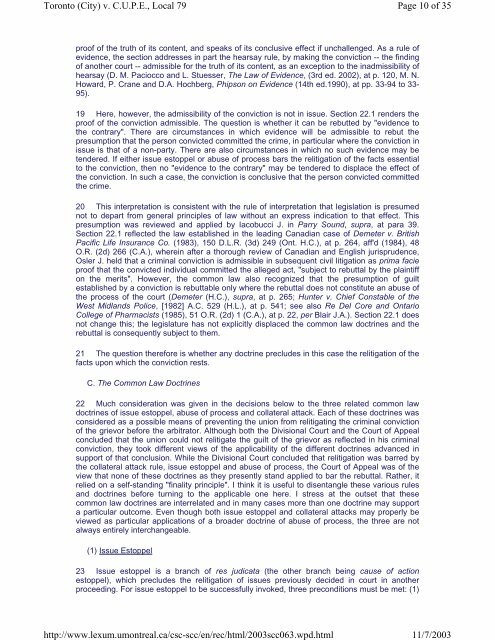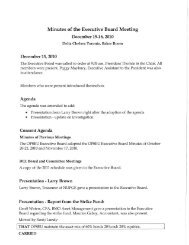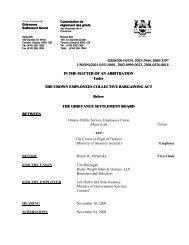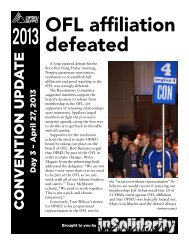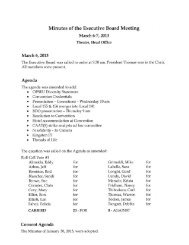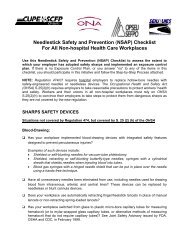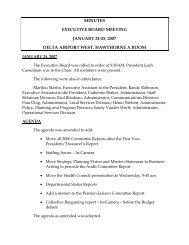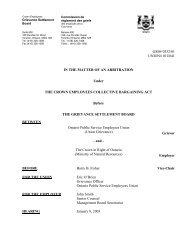C.U.P.E., Local 79 v. Toronto (City) .pdf - OPSEU
C.U.P.E., Local 79 v. Toronto (City) .pdf - OPSEU
C.U.P.E., Local 79 v. Toronto (City) .pdf - OPSEU
You also want an ePaper? Increase the reach of your titles
YUMPU automatically turns print PDFs into web optimized ePapers that Google loves.
<strong>Toronto</strong> (<strong>City</strong>) v. C.U.P.E., <strong>Local</strong> <strong>79</strong><br />
http://www.lexum.umontreal.ca/csc-scc/en/rec/html/2003scc063.wpd.html<br />
Page 10 of 35<br />
11/7/2003<br />
proof of the truth of its content, and speaks of its conclusive effect if unchallenged. As a rule of<br />
evidence, the section addresses in part the hearsay rule, by making the conviction -- the finding<br />
of another court -- admissible for the truth of its content, as an exception to the inadmissibility of<br />
hearsay (D. M. Paciocco and L. Stuesser, The Law of Evidence, (3rd ed. 2002), at p. 120, M. N.<br />
Howard, P. Crane and D.A. Hochberg, Phipson on Evidence (14th ed.1990), at pp. 33-94 to 33-<br />
95).<br />
19 Here, however, the admissibility of the conviction is not in issue. Section 22.1 renders the<br />
proof of the conviction admissible. The question is whether it can be rebutted by "evidence to<br />
the contrary". There are circumstances in which evidence will be admissible to rebut the<br />
presumption that the person convicted committed the crime, in particular where the conviction in<br />
issue is that of a non-party. There are also circumstances in which no such evidence may be<br />
tendered. If either issue estoppel or abuse of process bars the relitigation of the facts essential<br />
to the conviction, then no "evidence to the contrary" may be tendered to displace the effect of<br />
the conviction. In such a case, the conviction is conclusive that the person convicted committed<br />
the crime.<br />
20 This interpretation is consistent with the rule of interpretation that legislation is presumed<br />
not to depart from general principles of law without an express indication to that effect. This<br />
presumption was reviewed and applied by Iacobucci J. in Parry Sound, supra, at para 39.<br />
Section 22.1 reflected the law established in the leading Canadian case of Demeter v. British<br />
Pacific Life Insurance Co. (1983), 150 D.L.R. (3d) 249 (Ont. H.C.), at p. 264, aff'd (1984), 48<br />
O.R. (2d) 266 (C.A.), wherein after a thorough review of Canadian and English jurisprudence,<br />
Osler J. held that a criminal conviction is admissible in subsequent civil litigation as prima facie<br />
proof that the convicted individual committed the alleged act, "subject to rebuttal by the plaintiff<br />
on the merits". However, the common law also recognized that the presumption of guilt<br />
established by a conviction is rebuttable only where the rebuttal does not constitute an abuse of<br />
the process of the court (Demeter (H.C.), supra, at p. 265; Hunter v. Chief Constable of the<br />
West Midlands Police, [1982] A.C. 529 (H.L.), at p. 541; see also Re Del Core and Ontario<br />
College of Pharmacists (1985), 51 O.R. (2d) 1 (C.A.), at p. 22, per Blair J.A.). Section 22.1 does<br />
not change this; the legislature has not explicitly displaced the common law doctrines and the<br />
rebuttal is consequently subject to them.<br />
21 The question therefore is whether any doctrine precludes in this case the relitigation of the<br />
facts upon which the conviction rests.<br />
C. The Common Law Doctrines<br />
22 Much consideration was given in the decisions below to the three related common law<br />
doctrines of issue estoppel, abuse of process and collateral attack. Each of these doctrines was<br />
considered as a possible means of preventing the union from relitigating the criminal conviction<br />
of the grievor before the arbitrator. Although both the Divisional Court and the Court of Appeal<br />
concluded that the union could not relitigate the guilt of the grievor as reflected in his criminal<br />
conviction, they took different views of the applicability of the different doctrines advanced in<br />
support of that conclusion. While the Divisional Court concluded that relitigation was barred by<br />
the collateral attack rule, issue estoppel and abuse of process, the Court of Appeal was of the<br />
view that none of these doctrines as they presently stand applied to bar the rebuttal. Rather, it<br />
relied on a self-standing "finality principle". I think it is useful to disentangle these various rules<br />
and doctrines before turning to the applicable one here. I stress at the outset that these<br />
common law doctrines are interrelated and in many cases more than one doctrine may support<br />
a particular outcome. Even though both issue estoppel and collateral attacks may properly be<br />
viewed as particular applications of a broader doctrine of abuse of process, the three are not<br />
always entirely interchangeable.<br />
(1) Issue Estoppel<br />
23 Issue estoppel is a branch of res judicata (the other branch being cause of action<br />
estoppel), which precludes the relitigation of issues previously decided in court in another<br />
proceeding. For issue estoppel to be successfully invoked, three preconditions must be met: (1)


